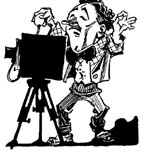
A Great Catholic Film (Made By a Protestant)
THE NINTH DAY (AVAILABLE ON DVD)
“Do you reject Satan? And all his works? And all his empty promises?” — Baptismal vows
The Catholic Church has always viewed the medium of film as a powerful and important means of artistic expression. On November 19, 1998, Pope John Paul II addressed a conference on film co-sponsored by the Holy See’s Pontifical Council for Culture and Pontifical Council for Social Communications. “From its birth, the big screen…is the mirror of the human soul in its constant search for God, often unknowingly,” the Holy Father told the conference’s participants. “With special effects and remarkable images, it can explore the human universe in depth. It is able to depict life and its mystery in images. And when it reaches the heights of poetry, unifying and harmonizing various art forms — from literature to scenic portrayal, to music and acting — it can become a source of inner wonder and profound meditation.”
Since the early days of motion pictures, Catholicism has frequently interested filmmakers regardless of their personal faith. In 1898 Pope Leo XIII allowed himself to be filmed by William K.L. Dickson, the inventor of the motion picture camera and a protégé of Thomas Edison. Among the greatest films of all time are those with explicitly Catholic themes, such as The Song of Bernadette (1943), Going My Way (1944), I Confess (1953), A Man for All Seasons (1966), and The Exorcist (1973), which are personal favorites of many Catholics and available on DVD.
In recent decades, however, a change has swept through the film industry. For the most part, Catholicism is either ignored or bitterly attacked and disrespected. Fortunately, there have been exceptions, most notably Mel Gibson’s international blockbuster The Passion of the Christ (2004).
You May Also Enjoy
With Forster’s A Passage to India Lean reached for something a bit deeper: to film the specifically spiritual against the background of the clash between English and Indian cultures.
I am convinced that the Bond series has functioned as the 20th-century edition of the Latinized (Virgilian) Homeric myth that has long served as our founding story.
As I write this column, America’s magazines and newspapers are offering a fairly extended discussion…

